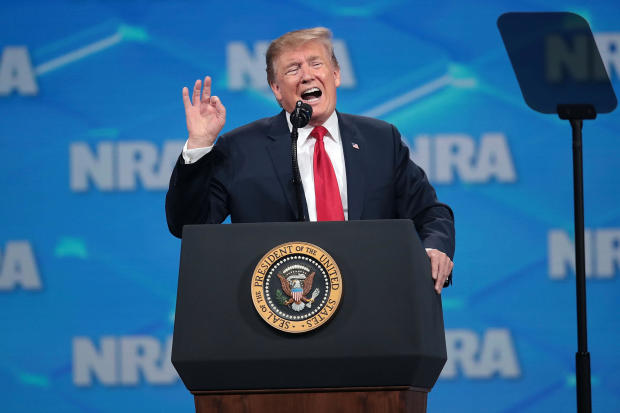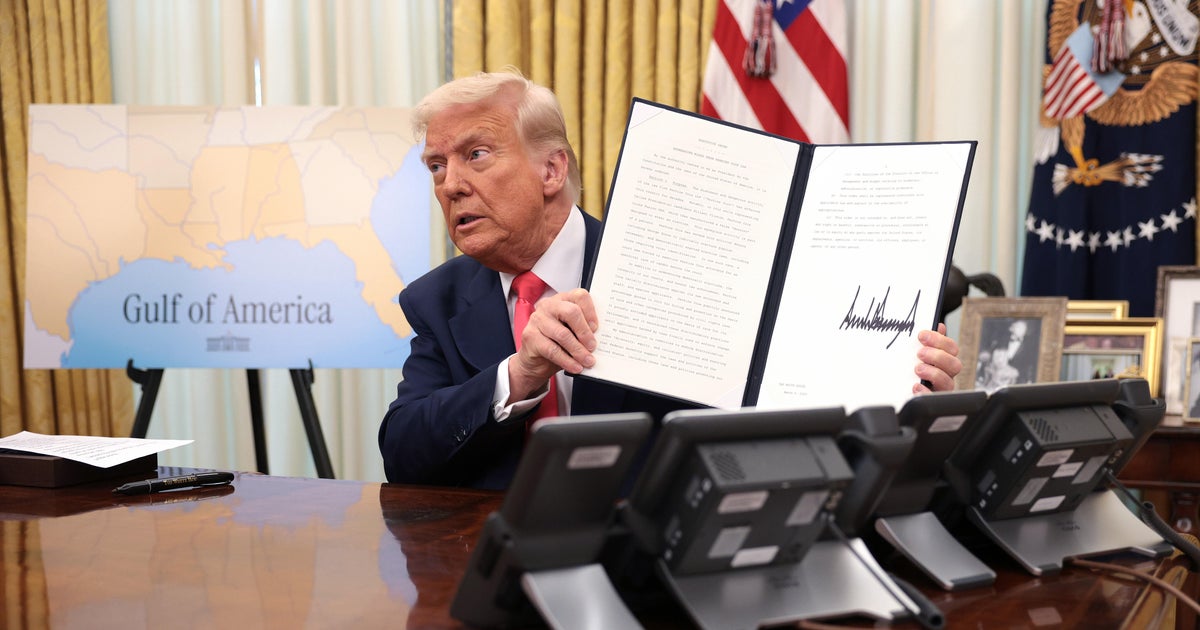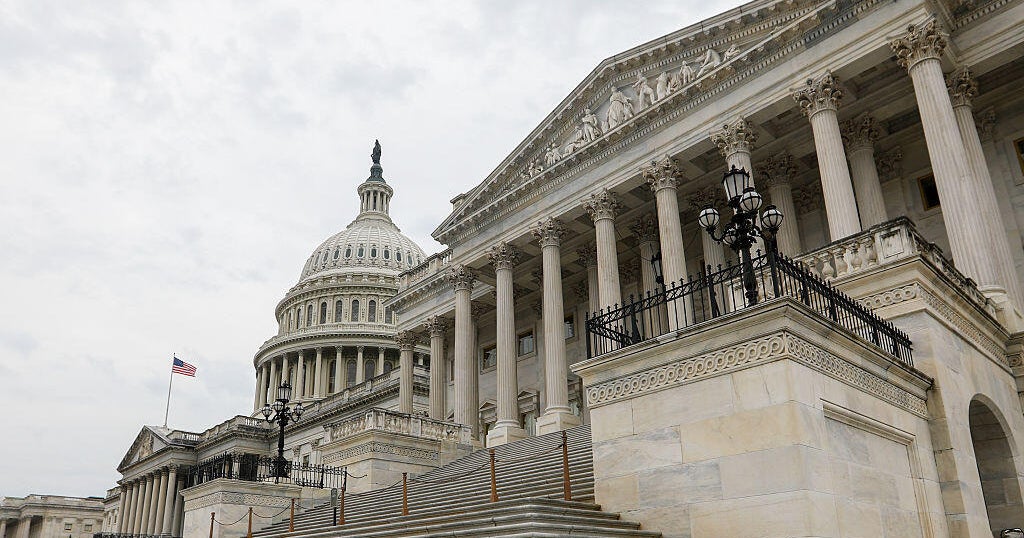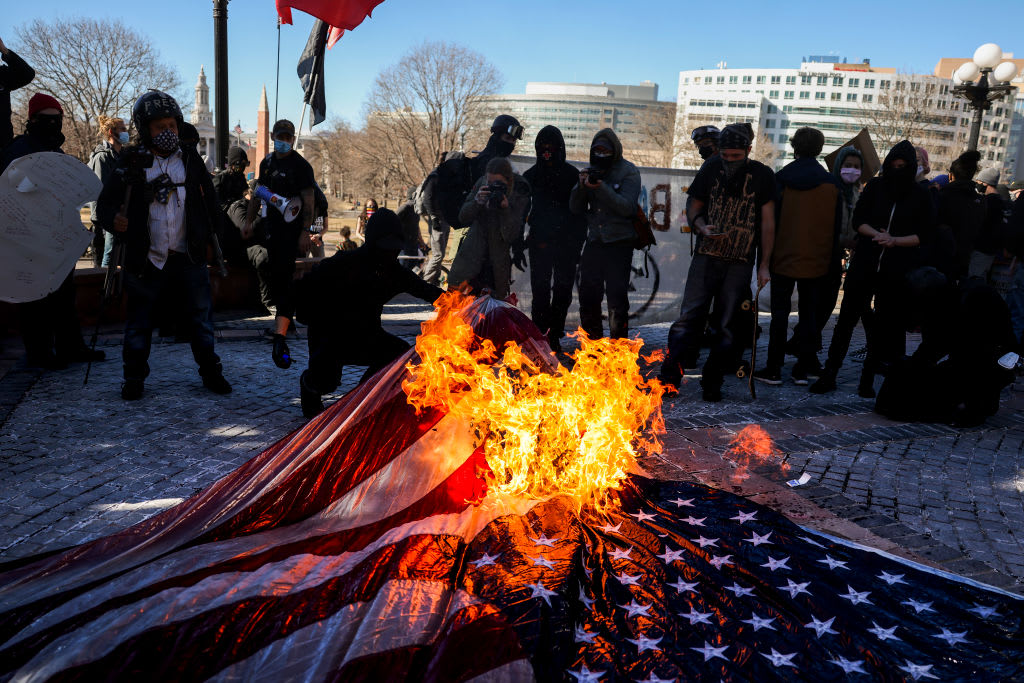Second Amendment advocates warn Trump over support for "red flag" laws
Washington — Second Amendment advocates are sounding the alarm over a potential expansion of state "red flag" laws, one of the gun reform measures President Trump has endorsed in the wake of the deadly mass shootings in Texas and Ohio.
Mr. Trump is urging Congress to back efforts to encourage states to adopt red flag laws, which give family members, and in some cases police officers, the power to obtain a swift court order from a judge to confiscate firearms from someone deemed a danger to themselves or others. The ability to obtain these "extreme risk protection orders" is already on the books in 17 states and the District of Columbia.
In the wake of the recent mass shootings, Mr. Trump spoke from the Diplomatic Room at the White House to call for adoption of red flag laws to "make sure that those judged to pose a grave risk to public safety do not have access to firearms and that if they do those firearms can be taken through rapid due process."
But some of the president's staunchest supporters and Second Amendment advocates are warning him of constitutional concerns about the laws, as well as potential political ramifications.
"This might be Donald Trump's 'read my lips' moment," said Michael Hammond, legislative counsel for Gun Owners of America (GOA), a gun rights group that prides itself on being even more uncompromising than the National Rifle Association (NRA). "If he basically tries to dismantle the Second Amendment community, he's going to be a one-termer. I firmly believe that."
There a tens of millions of gun owners in the U.S., with 5 million members of the NRA and 2 million GOA members, Hammond noted. He said Mr. Trump's reelection prospects could be in jeopardy if he loses support among gun owners, pointing to Mr. Trump's narrow margin of victory in several key states in 2016.
"Now, how many of these would he have to lose in order to lose the presidency?" Hammond asked. "It certainly depends on who the Democrats nominate, but it probably also depends on where the gun owners who sit on their hands are located."
Concerns from Second Amendment advocates about red flag laws were given life Tuesday morning, by none other than the president, who insists he is the strongest president on Second Amendment issues. Mr. Trump suggested CNN host Chris Cuomo should not be allowed to own a weapon after a video went viral showing Cuomo cursing out a stranger who approached him in public.
"Would Chris Cuomo be given a Red Flag for his recent rant? Filthy language and a total loss of control. He shouldn't be allowed to have any weapon. He's nuts!" the president tweeted.
That did not sit well with some conservatives and gun rights activists, who pointed to Mr. Trump's reaction as an example of the pitfalls of red flag laws.
"With one tweet POTUS explains how red flag laws can and will be abused," former NRA spokesperson Dana Loesch tweeted.
Republican Rep. Thomas Massie of Kentucky, a member of the House Liberty Caucus, tagged the president in a tweet voicing his concerns, writing, "If @realDonaldTrump signs a red flag law, it's likely to consist of taxpayer funded bribes to the states to adopt red flag laws. Ask your state rep and state senator where they stand."
"If you give up your principles to win an election, you've already lost before the first vote is cast. Red Flag laws violate due process and the 2nd Amendment," Massie also tweeted.
The Wall Street Journal reported Wednesday that Donald Trump Jr., an avid hunter with strong opinions about Second Amendment rights, has also raised concerns about the laws, in addition to proposals to strengthen background checks.
Mr. Trump has branded himself as a pro-Second Amendment president. "Your Second Amendment rights are under siege, but they will never, ever be under siege as long as I'm your president," Mr. Trump told attendees at an NRA conference in 2018. The NRA, which has been rattled in recent months by internal turmoil and financial uncertainty, donated millions to Mr. Trump's 2016 presidential campaign.
But this isn't the first time the president's apparent willingness to confiscate guns from potentially dangerous gun owners has sparked concern. After the deadly massacre at Marjory Stoneman Douglas High School in Parkland, Florida, in 2018, Mr. Trump insisted during a roundtable with lawmakers that he wanted to take guns from dangerous people and worry about due process later.
"Take the guns first, go through due process second," Mr. Trump said at the time.
Gun rights advocates warn red flag laws could violate the Fourth Amendment's prohibition on unreasonable searches and seizures, the 14th Amendment's due process clause and even the First Amendment.
Dave Workman, senior editor of the Second Amendment Foundation's The Gun Mag, said the red flag discussion is "eating up social media right now" among Second Amendment supporters.
"There is a considerable amount of alarm among firearms owners about these so-called red flag laws," Workman said.
Hammond said GOA believes red flag laws are "irredeemable."
Critics of red flag laws fear angry relatives with a grudge could obtain a court order to confiscate firearms. They also warn the government could eventually confiscate firearms based on political speech, or that law enforcement could endanger gun owners when they try to confiscate the weapons.
"I think the one sticking point is due process," Workman said. "In this country under our legal system you are presumed innocent until proven guilty in a court of law, but under one of these orders you are disarmed first, your guns are seized and then you can appear in court to defend yourself."
One of the most prominent cases of the use of a red flag law gone awry, highlighted by many Second Amendment advocates, occured in Maryland in November 2018. Police officers who were removing firearms pursuant to a protective order fatally shot 61-year-old Gary Willis, who answered his door with a gun in his hand. Willis initially put the gun down but picked it up again and was shot in an ensuing struggle, according to Anne Arundel County Police.
Republican Sen. Lindsey Graham of South Carolina and Democratic Sen. Richard Blumenthal are working on legislation aimed at encouraging more states to adopt red flag laws by establishing a federal grant program. Graham, a close ally of the president, has spoken with Mr. Trump about support for the laws, and told Fox News earlier this week that the Second Amendment "is not a suicide pact."
"Nobody is going to lose their gun unless they have their day in court, but we're not going to create a situation where the cops sit on the sidelines and watch somebody blow up when there are plenty warning signs," Graham said Monday.
Graham, who held hearings on red flag laws earlier this year, insists due process will be protected. Hammond and others don't believe that's the case.
Senate Majority Leader Mitch McConnell has pledged to bring up gun control when the Senate returns from recess next month, and the House, which passed stringent gun control legislation earlier this year, also has plans to revisit the issue. Advocates for further gun restrictions are skeptical anything will happen. Mr. Trump claims that this time, more than a year after the Parkland shooting, is different.
"Time goes by," Mr. Trump told reporters last week on the White House South Lawn. "I don't think I'm different, but I think the Senate is different. I think other people in the House are different. I think that people that maybe had their arm up a couple of years ago, maybe they feel differently. I don't think I feel any differently."




